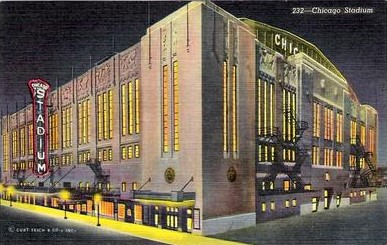Authors:
Historic Era: Era 8: The Great Depression and World War II (1929-1945)
Historic Theme:
Subject:
Fall 2024 | Volume 69, Issue 4


Authors:
Historic Era: Era 8: The Great Depression and World War II (1929-1945)
Historic Theme:
Subject:
Fall 2024 | Volume 69, Issue 4
Editor’s Note: Paul M. Sparrow is the former Director of the Franklin D. Roosevelt Presidential Library and Museum. He has recently published Awakening the Spirit of America: FDR's War of Words With Charles Lindbergh — and the Battle to Save Democracy, which tells the dramatic story of how Roosevelt prepared the nation for the fight to save democracy at a time when most Americans opposed intervention, and the America First movement fought aggressively to thwart his efforts. Mr. Sparrow provides an adaptation from his fascinating book in the essay that follows.

Late in the afternoon of April 17, 1941, pedestrians began streaming through Chicago’s downtown, heading for the stadium at the corner of Erie and West Madison. When completed in 1929, Chicago Stadium had been the world’s largest indoor arena, home ever since to the Second City’s beloved Blackhawks. Tonight, the stadium was hosting a rally booked by the America First Committee and featuring that group’s newest spokesperson, Charles Lindbergh. After months of keeping America First at arm’s length, the celebrity isolationist had finally reasoned that the nation’s many such entities ought to unite under a single banner — the banner of America First.
More than 10,000 people had crammed into the enormous hall; loudspeakers outside reached another 4000 milling partisans. From the high vaulted ceiling hung more than 50 giant American flags and enormous loops of red, white, and blue bunting. Onstage stood portraits of George Washington and large signs reading “Defend America First.” Charles Lindbergh came to the podium to ecstatic cheers and applause. Once the ovation dwindled Lucky Lindy explained why he had finally allied publicly with the event’s sponsor.
“The America First Committee is a purely American organization formed to give voice to the hundred odd million people in our country who oppose sending our soldiers to Europe again,” Lindbergh said. “Our objective is to make America impregnable at home, and to keep out of these wars across the sea. Some of us, including myself, believe that the sending of arms to Europe was a mistake — that it has weakened our position in America, that it has added bloodshed in European countries and that it has not changed the trend of the war.”
The audience repeatedly screamed its support as if with one voice, interrupting him 31 times, according to the Chicago Tribune, whose publisher Robert McCormick was helping